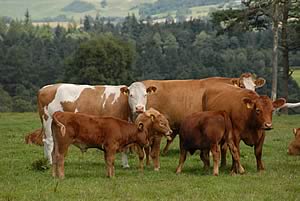21/05/08
Positive profit levels may still be a distant dream for hard pressed suckled calf breeders but they should not throw in the towel, because events already underway in the predominantly English dairy sector look likely to give them a useful income boost.
This is the view of the National Beef Association which is aware that the huge swing to Holstein inseminations in the dairy herd, which began last September in response to EU moves to dismantle milk quota restraints by 2015, could result in an 18-19 per cent fall in UK beef output from June 2009.
And thinks this dramatic reduction in slaughter cattle numbers should push the UK’s, mainly suckler based, prime cattle average, which is already hovering at around 270p per dwkg, to a much higher plane - and perhaps take prices to a level at which the costs of producing suckled calves for slaughter are more than covered.
“UK dairy farmers have reacted to the European Commission’s expansive milk market plans by inseminating up to 80 per cent of their cows to the Holstein compared with the usual maximum of 60 per cent and occasional periods when purebred dairy semen accounted for only 40 per cent of AI work,” NBA director, Kim Haywood told journalists attending the Association’s Beef Expo 2008 at Perth.
“As a result up to 350,000 less beef cross calves a year, which is likely to be the equivalent of 18-19 per cent of UK prime cattle output in the 12 months from June 2009, are expected to be produced from the dairy herd from next month (June 2008) on.”
“And unless these missing beef animals are immediately replaced by at least an equivalent number of purebred Holstein bull calves, a significant fall in UK beef output, and an accompanying price rise for the home produced beef cattle still on offer would appear to be inevitable.”
According to the NBA the chances of a compensatory 350,000 plus Holstein bull calves a year being taken on by rearers, and then passed on to finishers, do not look good.
Even before dairy farmers began to breed many more replacement heifers around 480,000 purebred bull calves were born each year but less than 230,000 were reared for beef – mainly as 12-14 month old cereal fed bulls.
“And over the last twelve months the number reared may have fallen to only 120,000 head after the doubling of feed grain costs and the persistent discount on O-3 carcases put off specialists who even now are earning only 235p-241p per dwkg,” said Ms Haywood.
“This means dramatically shorter beef supplies from UK sources can only be avoided from summer 2009 onwards if much greater numbers of Holstein bull calves are pushed into newly constructed rearing systems or retailers, caterers and manufacturers can make up the missing volumes by using imported beef instead.”
“But supply development prospects on the import front do not look good either. Brazil may not be in a hurry to invest in meeting the EU’s costly import standard demands and the Argentine government would clearly like to keep as much of its own beef as possible on its home market.”
“This leaves the Republic of Ireland as the biggest import source. However if its dairy farmers react in the same way as those in the UK, and the euro continues to hold its high exchange rate against sterling, it will not only have less beef to export but also find that what is available can be sold more profitably to euro paying countries instead.”
“All of these points to much brighter prospects for UK’s suckler sector than many might think. Breeders and finishers who are thinking of quitting should wait and see if dairy farmers are still breeding for heifers in 12 months time, if there has been a compensatory take up of Holstein bulls in England, and whether these pre-dominantly dairy beef moves raise the chances of building a bigger premium for suckler bred beef produced in the UK, particularly Scotland, as well,” Ms Haywood added.
 Charolais Cattle Meet Unprecedented Demand in Newark Charolais Cattle Meet Unprecedented Demand in Newark
 Commission Report Reinforces Brazilian Beef Concerns Commission Report Reinforces Brazilian Beef Concerns
 New Worcester Venue for British Blondes New Worcester Venue for British Blondes
| 


